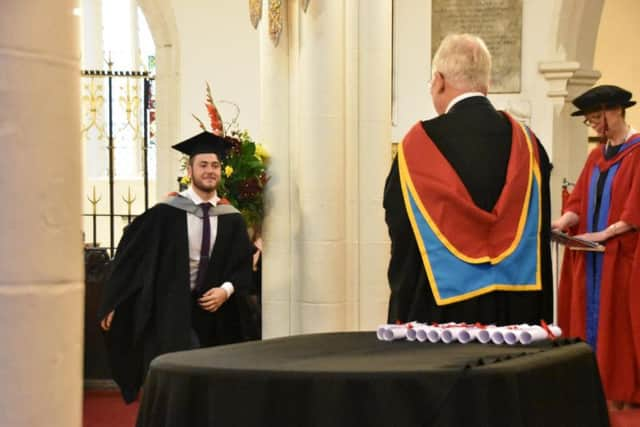‘How a degree changed our lives’


With an average annual cost of more than £9,000 university tuition fees in England are among the highest in the world.
For some, this cost is enough to put them off pursuing their education dreams. However, more and more students are opting for higher education colleges to get a degree without the high price tag.
Shauna Campbell, 22, from Up Holland, studied Level 3 Business gaining a triple Distinction star at Wigan & Leigh College.


She went on to study HNC/HND Business at University Centre Wigan & Leigh College and then a top up degree, to achieve a first-class BA (Hons) in Business Administration.
During her degree study she worked with the Greater Manchester (GM) Higher team, as a student ambassador and is now working full-time as a graduate advisor.
“One of the highlights of my degree study was working with GM Higher,” she said.
“I grew my skill set and gained in confidence. And, of course, I was thrilled to achieve a first-class degree.”


‘I wanted to challenge myself’
The University Centre Wigan & Leigh College works in partnership with the University of Central Lancashire (UCLan) and Pearson Edexcel.
It offers Foundation Degrees, Higher National Certificates, Higher National Diplomas, Top-up Degrees and professional and post-graduate courses, as well as higher and degree apprenticeships.
John-Paul Sweeney, 30, from Wigan, swapped a career as a hospital chef for engineering. Having achieved a Level 3 Extended Diploma in Electrical and Electronic Engineering he decided to push himself further by joining the University Centre.


“I wanted to challenge myself, as I thought it would be the one of the more difficult courses,” he said.
The father-of-two is now enjoying his job as an inspection and test engineer for Thermal Hire. He has his sights set on becoming a project engineer.
What is a university centre?
University centres offer students the chance to study higher education qualifications on their doorstep.
At the University Centre Wigan & Leigh College there are more than 30 courses and career pathways.
Higher level and degree courses are available for £7,500 or less, meaning learning locally isn’t just a convenient option, but a cost-effective one. Students can save on course fees and expensive accommodation. Smaller campuses also mean they get more contact time with tutors.
Alannah Mulligan’s career really took off when she gained her British Airways wings and became cabin crew.
The 20-year-old from Wigan studied the HNC Travel and Tourism Management course, and says she was well prepared for the travel industry.
“Modules on the HNC/D are designed to be industry specific and really helped me to understand the skills needed to succeed,” she said.
“The tutors have lots of experience and were really supportive. The course has helped me to become fully prepared for my career choice.”
A history of education
The University Centre is a giant leap from the college’s early days as a training school for mineworkers.
Founded in 1857 as Wigan and District Mining and Technical College it taught students engineering, maths, geology, chemistry and physics.
However, its evolution to higher education status more than 70 years ago was a turning point transforming the lives of thousands of young people.
As well as offering the chance to gain better qualifications, it brought the prospect of a life beyond the pits.
In 1956 there were just 17 graduates from the college, each paying around 15 guineas per session for a qualification linked to University of London.
Now there are now more than 600 students studying for higher education qualifications.
The range of courses on offer is much wider than that offered to early students but still includes areas such as civil, electrical and mechanical engineering.
There are also some courses miners might not have been so familiar with, including computing, travel and tourism and criminology and sociology.
Lorna Sowerbutts, 20, from Clitheroe, is a degree apprentice nuclear technician at Sellafield Ltd. “I wasn’t keen on going to university full time but wanted to get into higher education,” she said.
“Taking a degree apprenticeship suits me because I can work and learn at an advanced level.
“Apprenticeships are great because you can study a higher level and learn from other people’s experience too.
“You get the chance to become independent, earn a salary and learn key life skills.”
Employers pay tuition fees for degree apprentices, so graduates are not left with a student loan debt.
Find out more
The University Centre offers a range of qualifications for full and part-time students.
Course areas include business management, creative industries and new media, education, STEM subjects and health and social care.
With millions of pounds invested in new facilities, resources and equipment now is the perfect time to take the next step in your higher education journey.